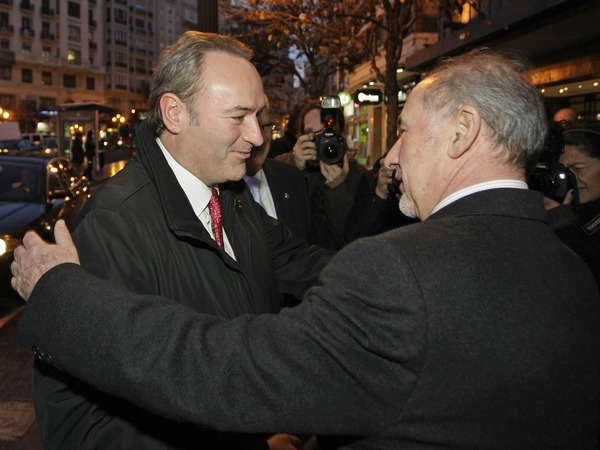The Cunning Valencian Branch of Bankia
Politicians and business associations from Levante place their members on the board of the savings and loan bank.
When the Bankia disaster unfolded, the institution had more than a few Valencian representatives on its board of directors. The most prominent of the group was Francisco Pons Alcoy, president of Importaco. This businessman came to the savings bank after serving as the president of the Valencian Association of Businessmen (AVE) for eight years. There, he rubbed elbows with the elite of the Valencian business community, including Juan Roig, president of Mercadona. Both Pons Alloy and Roig are vice presidents of the business school EDEM, an institution linked to the AVE and whose secretary general is Hortensia Roig, daughter of the supermarket chain mogul.
Fracisco Pons came to Bankia with the trust of the Valencian business sector in his hands, taking the place of José Luis Olivas as vice president, a position reserved for Valencian representatives of the old Bancaja. Olivas is the paradigm of political officials taking positions in savings and loan banks, although he is one of the more conspicuous examples. Olivas was president of the Generalitat Valenciana for one year, inheriting the job from Eduardo Zaplana after the latter was named minister. When the Autonomous Communities election took place in 2003, the Partido Popular chose Francisco Camps over Olivas as its Valencian candidate. Olivas, however, did not have to grieve his loss for too long, because, soon after, he was named president of Bancaja and, after the merger, vice president of Bankia.
Another Valencian board member during the government bailout was Francisco Juan Ros García, also proceeding from the business sector. Until August 2013, when he was named joint director after a change in the institution’s board, Ros was delegate advisor of Grupo Ros Casares. Furthermore, the Association for Progress in Management (APD) in Levante named him president, by Olivas’ own proposal. The APD, of which Ros is also vice president, is a group of the most important business people in the country which has had Mariano Rajoy as a speaker in a few of its annual congresses.
Also landing in Bankia from Levante was Juan Martín Queralt, the Generalitat Valenciana’s general director of taxation and economic policy from ’82 to ’85 and spokesperson of the Valencian Human Rights Observatory, the Generalitat Valenciana’s consultancy organ.
From Valencia to Madrid
The alliance between Caja Madrid and Bancaja producing Bankia aided in widening connections between business people, politicians and community members of both autonomous communities. José Manuel Serra Peris, a Valencian lawyer and board member of Bankia before the bailout, had also made a name for himself in the capital city. From 1998 to 2000, at the end of the first legislature of José María Aznar and under the umbrella of Josep Piqué’s ministry, he was secretary of the State of Industry and Energy. In June of 2000, in honor of his service to the country, the king awarded him the Gran Cruz de Isabel la Católica (Grand Cross of Isabel the Catholic).
Serra Peris has been on the boards of Martinsa-Fadesa and Iberia and currently serves on the board of Ence. What happened to his career after resigning from his position at Bankia? Since November 2012, he has been vice president of Canal de Isabel II, the company that manages Madrid’s water.
